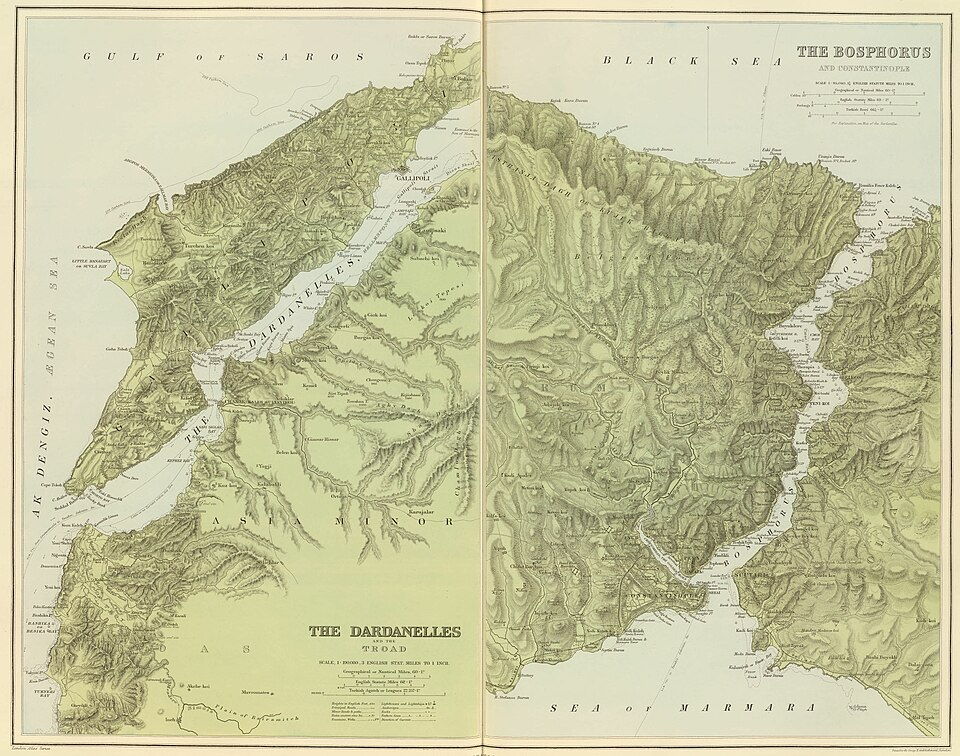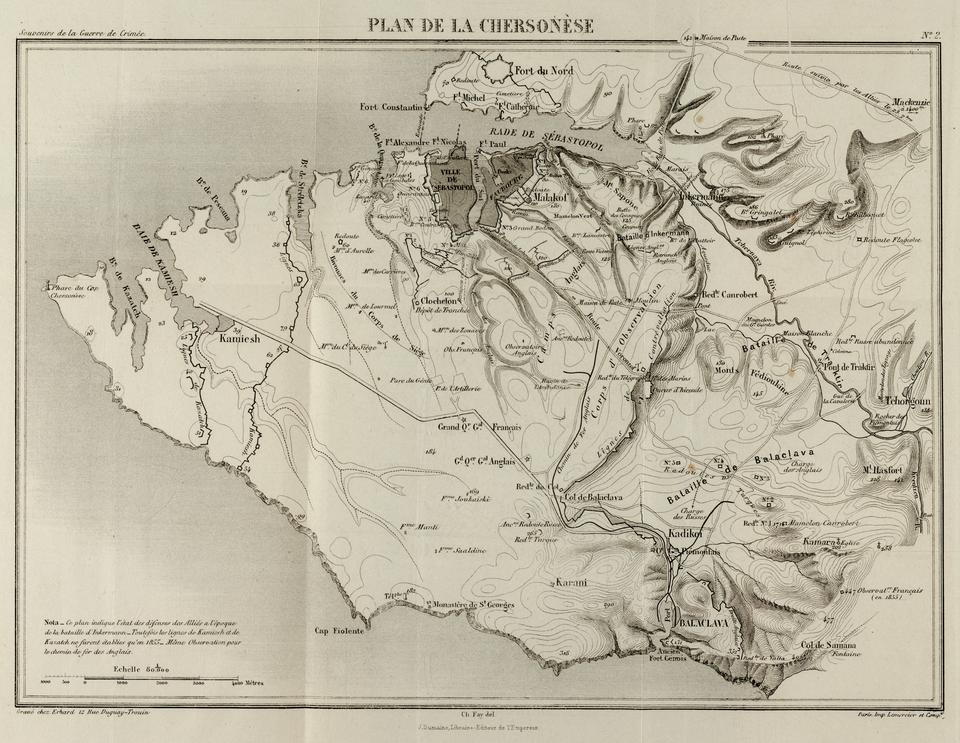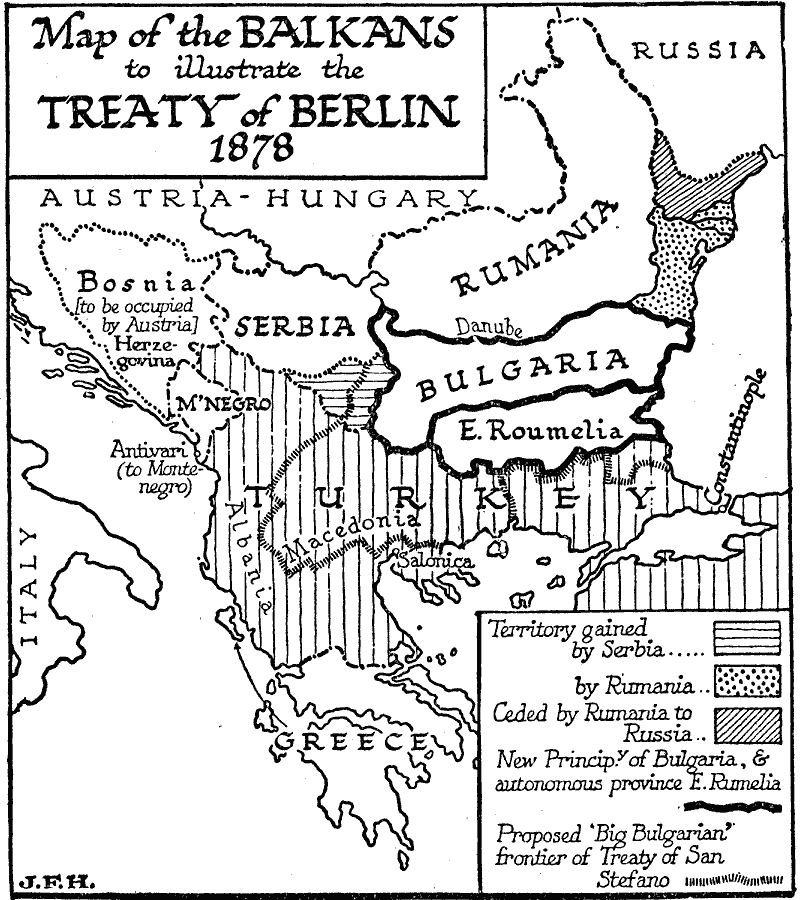IB Syllabus focus:
'Analyze the "Eastern Question," European challenges, and Ottoman responses, including the Crimean War and 19th-century crises in the Balkans.'
In the 19th century, the geopolitical and strategic interests of the European powers were piqued by the decline of the Ottoman Empire, leading to the complex diplomatic conundrum known as the "Eastern Question".
The Genesis of the Eastern Question
The Eastern Question pertained to the fate of the Ottoman Empire’s territories and how the power vacuum would be filled following its inevitable decline. The question became significant due to the strategic importance of the empire's lands, which served as crossroads between Asia and Europe.
It raised concerns about who would control the Bosphorus and the Dardanelles, crucial maritime routes for Russia's navy and commerce.

This late-nineteenth-century map situates the Bosphorus and Dardanelles—the maritime chokepoints linking the Black Sea to the Mediterranean—whose control lay at the heart of the Eastern Question. It highlights the narrowness of the straits and the approaches to Constantinople, clarifying why great-power rivalry focused here. Note that the cartography slightly postdates mid-century events but accurately depicts the strategic geography. Source
There were religious and cultural interests at stake, particularly for Russia and Britain, who positioned themselves as protectors of Orthodox and Anglican interests, respectively. This period also saw significant reforms in Ottoman society and contributions, aiming to modernise and strengthen the empire.
European Interests and Ambitions
Each major European power had distinct ambitions that fuelled their involvement in the Eastern Question:
Russia: Aimed to extend its influence southwards, gain control of the Black Sea, and secure access to the Mediterranean.
Britain: Focused on maintaining the balance of power in Europe and protecting its route to its Indian colony.
France: Sought to extend its influence in the Eastern Mediterranean and North Africa.
Austria-Hungary: Desired to contain Slavic nationalism and maintain its own multi-ethnic empire's stability. The rise of Prussia and decline of Austria played a significant role in reshaping the region's power dynamics.
The Crimean War (1853–1856)
Origins and Outbreak
The war was ignited over a dispute between France and Russia over the rights of Christian minorities in the Holy Land, then under Ottoman control.
Russia occupied the Danubian Principalities, prompting Ottoman declaration of war in 1853. This was a critical episode in the broader context of European diplomacy and the changing balance of power during the 19th century.
IB History Tutor Tip: Understanding the Eastern Question illuminates the intricate power play in 19th-century Europe, showcasing how geopolitical interests shape international relations and set the stage for future conflicts.
Key Battles
Siege of Sevastopol: The primary base of Russia's Black Sea Fleet was under siege for nearly a year.
Battle of Balaclava: Included the ill-fated Charge of the Light Brigade, illustrating the miscommunications typical of this war.

This 1855 map shows the port of Balaklava, the roads to Sevastopol, and the Grand Crimean Central Railway that supplied the Allied siege lines—key to understanding the campaign’s operational geography. It clarifies why Balaklava became the British base and how communications shaped the siege. . Source
Diplomatic and Military Outcomes
Treaty of Paris: Checked Russian expansion by neutralising the Black Sea, thus hindering its naval power.
Highlighted the deficiencies in the Ottoman military structure and European war tactics.
Led to a shift in the European balance of power and set the stage for later conflicts in the region.
19th-Century Crises in the Balkans
The Ottoman Empire's weakening grip on the Balkans sparked a series of crises and wars throughout the 19th century.
The Great Eastern Crisis (1875–1878)
Began with the Herzegovina Uprising and the April Uprising in Bulgaria; the latter saw a brutal response from the Ottomans, which shocked Europe.
The Berlin Memorandum of 1876, proposed by the Great Powers, was meant to enact reforms but was rejected by the Ottomans, leading to war with Russia. The era of reform in Tsarist Russia under Alexander II also influenced the dynamics of these conflicts.
Treaty of Berlin (1878)
This treaty significantly reduced Ottoman holdings in the Balkans and confirmed the independence of several states.

This educational map summarizes the 1878 settlement: the reduced Ottoman footprint, the autonomous province of Eastern Rumelia alongside the Principality of Bulgaria, Austro-Hungarian administration of Bosnia-Herzegovina, and territorial adjustments for Serbia and Romania. It provides a concise visual of the diplomatic outcomes you outline. Source
It represented a major setback for the empire, although it did manage to retain control over Eastern Rumelia and Macedonia.
Ottoman Responses to the Eastern Question
The Ottoman Empire engaged in a series of efforts to counter the threats posed by the Eastern Question.
Diplomatic Manoeuvres
The Ottomans played the European powers against one another, exploiting their rivalries to maintain some degree of sovereignty.
Sought to win favour by implementing reforms intended to protect Christian minorities, thus addressing one of Europe’s main concerns.
Military and Administrative Reforms
The empire attempted to modernise its military through the adoption of Western technologies and strategies. These efforts can be compared to responses in later crises, such as the Abyssinian Crisis and the League of Nations' response.
The Tanzimat reforms aimed to reorganise the administrative structure of the empire, modernising it in line with European states.
The Impact of Reforms
The reforms had mixed success; while they modernised certain aspects of the state, they also created new tensions within the empire.
Nationalist movements among various ethnic groups within the empire were partially spurred by these reforms.
IB Tutor Advice: For exam success, focus on the causes and consequences of the Eastern Question, particularly its impact on European diplomacy and the balance of power leading up to World War I.
Significance of the Eastern Question
The Eastern Question was more than a diplomatic challenge; it was symptomatic of the shifting dynamics of 19th-century international relations.
It exemplified the interplay between declining empires and rising nationalisms, a recurring theme in European history.
The attempts to address the Eastern Question without a major war were ultimately unsuccessful, setting the scene for the conflicts that led to World War I.
The struggles of the Ottoman Empire during this period reflected the broader impact of modernisation and change in the era, as well as the difficulties traditional empires faced in adapting to a rapidly changing world.
Through a detailed study of the Eastern Question, students can gain insights into the complexities of 19th-century international politics, the processes of imperial decline, and the origins of modern-day conflicts in the Balkans and the Middle East. Understanding these historical dynamics is crucial for comprehending the contemporary political landscape and the historical context of current events. For further insights, you can explore the broader impact on European states and their policies, such as those during the era of reform under Alexander II.
FAQ
The Crimean War had significant implications for international diplomacy and alliances. The alliance of France, Britain, the Ottoman Empire, and Sardinia against Russia marked one of the first major cooperative military efforts between Western European powers and the Ottoman Empire, illustrating a shift from the traditional balance-of-power diplomacy to a more complex system of alliances. The war resulted in the Treaty of Paris in 1856, which temporarily settled the Eastern Question by checking Russian expansion. However, it also exposed the need for reform within the alliances themselves, leading to increased tension between Austria and Russia, who had previously cooperated. The Crimean War hence was a precursor to the complex alliance systems that developed in the lead-up to World War I.
The Great Powers were interested in the internal affairs of the Ottoman Empire primarily due to the empire's strategic location and the potential for power shifts in Europe. Control over the Ottoman territories meant influence over critical trade routes and strategic military positions, such as the access to the Mediterranean through the Dardanelles. Additionally, the decline of the Ottoman Empire raised the prospect of controlling its territories, thereby expanding the sphere of influence for the European powers. There were also economic interests in the rich resources of the region and the desire to spread their cultural and religious influence, seen in the Russian protection of Orthodox Christians and the French advocacy for Catholics in the empire.
In the immediate aftermath of the Eastern Question, the Ottoman Empire initiated a series of reforms known as the Tanzimat, aimed at modernising the state and appeasing the European powers to maintain its sovereignty. These included legal reforms to guarantee rights to all citizens regardless of religion, restructuring the tax system, and modernising the army. Long-term effects included the gradual secularisation of the state and society, as well as the creation of a more centralised administrative structure. However, these reforms also had unintended consequences, such as alienating traditional power holders and contributing to the rise of ethnic and nationalist tensions within the empire’s diverse population. The pressures stemming from the Eastern Question and the attempts to address it thus led to profound changes in Ottoman governance and society.
Nationalism played a central role in the Balkan crises of the 19th century as various ethnic groups within the Ottoman Empire sought self-determination and independence. The rise of nationalist sentiment among these groups, such as the Serbs, Greeks, and Bulgarians, led to uprisings and the establishment of nationalist movements that directly challenged Ottoman authority. The spread of nationalist ideas was partly a consequence of the broader European trend towards nation-state formation and was exacerbated by the Great Powers’ support for these movements as a means to further their interests in the region. These nationalist movements not only contributed to the destabilisation of the Ottoman Empire but also to the ethnic tensions and conflicts that would plague the Balkans into the 20th century.
The Ottoman Empire’s strategic location at the crossroads of Europe and Asia made it a pivotal region for trade and military strategy, particularly concerning the control of the Bosphorus and Dardanelles straits, which were vital maritime routes for Russia’s access to the Mediterranean. This geostrategic significance meant that the decline of Ottoman power had wide-reaching implications for the balance of power in Europe. It threatened to open the region to Russian expansion, which alarmed Great Britain due to the potential threat to its naval dominance and routes to India. The strategic location, thus, made the Ottoman Empire’s stability or decline a matter of European and, by extension, international concern, fuelling the complexities of the Eastern Question.
Practice Questions
The Crimean War was significant in the context of the Eastern Question as it highlighted the fragility of the Ottoman Empire and altered the power balance in Europe. It demonstrated the empire's military vulnerabilities and the urgency for reform, prompting the Tanzimat reforms. Moreover, the war showed the interplay of great power politics, with Britain and France intervening to prevent Russian expansion. The Treaty of Paris, which concluded the war, neutralised the Black Sea, thus curtailing Russian naval power and maintaining the status quo, albeit temporarily. It also set a precedent for the Concert of Europe's intervention in Ottoman affairs, foreshadowing later conflicts in the region.
The Treaty of Berlin had a profound impact on the Ottoman Empire. It diminished Ottoman sovereignty over the Balkans, leading to the loss of significant territories and the emergence of independent states like Serbia and Romania. The treaty also imposed a European commission to oversee reforms in Bosnia and Herzegovina, reflecting the diminished autonomy of the empire. The creation of a smaller, weaker Ottoman Balkan presence significantly altered the region's ethnic and political landscape, laying the groundwork for future Balkan nationalism and conflict. This realignment of boundaries and power directly undermined the Ottoman’s territorial integrity and furthered its decline as a major imperial power.

